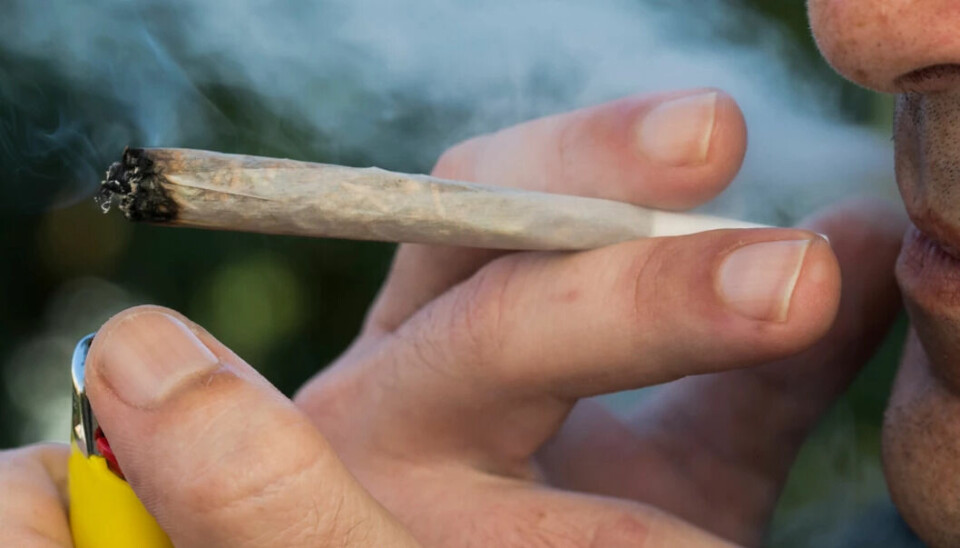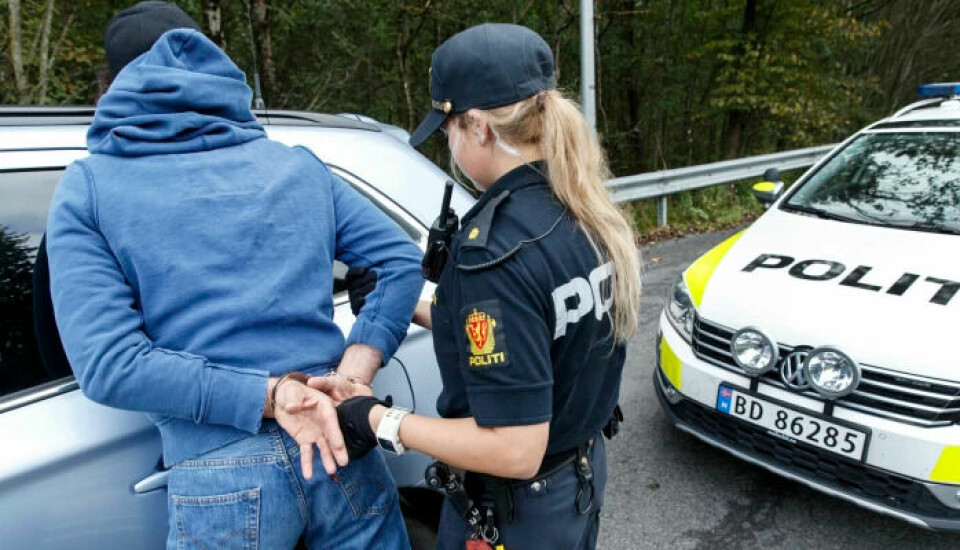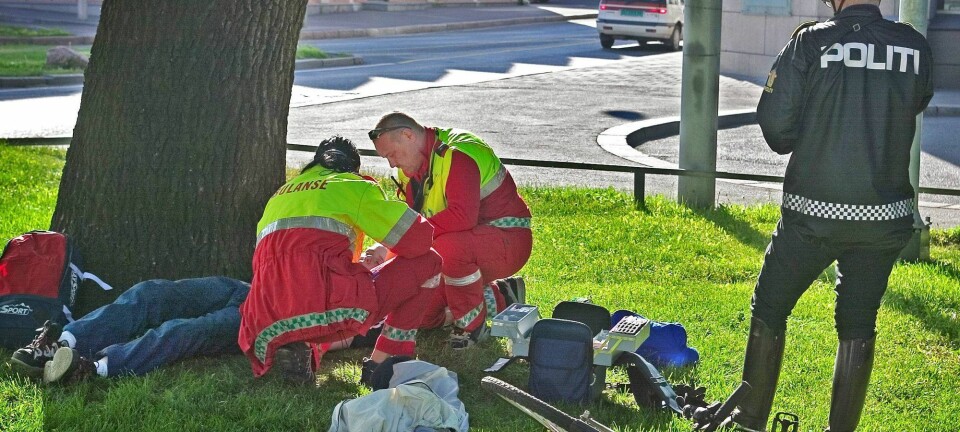
No decriminalisation of drugs in Norway yet: Being caught with a joint can still have major consequences
There was a historic drop in reported drug offenses last year, as well as a sharp reduction in penalties. “Some people probably think that drugs have been decriminalised in Norway. This is not the case,” says researcher Katrine Holter.
A lot has happened to Norway’s drug policy recently.
“Many are probably a little confused about what punishment now applies for drug use,” Katrine Holter, a researcher at the Norwegian Police University College, says.
Erna Solberg’s conservative government proposed a drug reform a year ago but was voted down by the Parliament. The majority in the committee that worked on the reform suggested that it should still be illegal to use and possess drugs, but that it should not be punishable.
In other words: decriminalisation of drug use in Norway.
The Labour Party and the Centre Party instead tried to bring about partial decriminalisation. They wanted decriminalisation only for those with a significant substance use disorder. Young people and so-called recreational users should still be punished.
The rest of the parties did not agree to this. All the other parties, except for the Progress Party, wanted decriminalisation for everyone.
With no majority for any of the suggestions, no drug reform came into effect.

Broad political agreement on punishment
But even though the reform was voted down, the vast majority of politicians in the Parliament agreed on one thing: It is not appropriate to punish people with drug addictions.
This is what Norwegian courts have perceived; they believe they have received a clear signal from politicians.
In the last year, they have therefore reduced the penalties for those with a substance use disorder even though the Storting has not yet made changes to the law.
No more stop and search
Based on the viewpoint of the Parliament, the Supreme Court of Norway has decided that those with substance use disorders will no longer receive punishment for their own personal use.
According to instructions from the Attorney General, if the police suspect that a person in possession of drugs for their own use is addicted to drugs, then the person should no longer be stopped, searched, or arrested.
Personal use allows for 5 grams of heroin, amphetamine and cocaine. For cannabis, the limit is set at 15 grams.
A sharp reduction in penalties has also been introduced for those addicted to drugs who exceed these limits.
- RELATED: More than six out of ten people with substance abuse issues say they get the help they need
Emphasis on the draft legislation
It is not new that the courts give lesser punishment to those with a substance use disorder. This started before the drug reform was proposed, Holter tells sciencenorway.no.
However, if you are under the impression that the Attorney General and the court are calling their own shots and steering Norway’s drug policy, Holter disagrees.
“They have followed up on what the politicians have wanted. In the Parliament's consideration of the drug reform, as usual, draft legislation was created. There, they wrote that it is considered inappropriate to punish those addicted to drugs,” she says.
In law, great emphasis is placed on such preparatory work, she points out. The legislature says something about what is meant by the law.
“That the courts are now not giving out sentences to those with a substance use disorder, is safely within the mandate given by the legislature,” Holter says.
What about those who are not addicted?
They are often called recreational users, drug users who are not seen as suffering from addiction and who, for example, smoke a joint every now and then. What if they are caught in the possession of drugs?
"Recreational users who smoke a joint can still be punished," says Holter.
Recently, however, the Supreme Court has refused to prosecute the appeal of a man who had 10 grams of amphetamine hidden in his car. Despite not being considered to have an addiction, he did not receive a prison sentence.
The man, who had a long career in the cultural industry, said that he struggled with tendonitis. He therefore bought 10 grams of amphetamine in order to be able to complete his job as a onetime solution, he told the court, according to rett24.no (link in Norwegian).
10 grams of amphetamine
10 grams of amphetamine is twice as much as what the previous government proposed should be the threshold value needed to prosecute.
The Borgarting Court of Appeal ruled that he should be sentenced to probation. This was appealed by the prosecution. The Appeals Selection Committee of the Supreme Court of Norway concluded that there was insufficient reason to present the appeal to the Supreme Court.
“I see that some interpret this as a strong signal from the Supreme Court that also recreational users should be punished more leniently. I would be wary of interpreting too much out of an appeal denial,” Holter says.
She nevertheless believes that a sharp reduction in the level of punishment for those addicted to drugs will eventually also affect the level of punishment for recreational users.
“We have a strong tradition of treating the same acts equally in Norwegian criminal law,” she says.
Far from decriminalisation
“It is still not clear where this drug policy will land,” Holter says.
She believes that decriminalisation for all drug users will eventually happen in Norway.
“But it is still unclear and therefore quite exciting to see how this will continue to develop,” she says.
She emphasises that drugs have not become decriminalised – whether in whole or partially – in Norway, despite the Supreme Court's steps towards lesser punishment.
“The use and storage of illegal drugs is still a criminal offense for everyone, including those with a substance use disorder,” she adds.
Distinguish between responsibility and reaction
The Labour Party and the Centre Party wanted to partially decriminalise drug possession, but only for those who are addicted. This led to objections because it is incredibly difficult to ascertain who is addicted and who is not.
“Therefore, it should be decriminalised for everyone. But it is less problematic to distinguish between drug users in the question of punitive action than in the question of what should be punishable. The Supreme Court has now made the first step,” Holter points out.
“To understand the Supreme Court's latest decisions, one must be aware that there is a distinction between criminal liability and punitive action,” she says.
You can be held criminally liable because you have violated the norms of society without necessarily receiving a fine, prison sentence, or other forms of punishment, Holter explains.
Many misunderstand
The Supreme Court has therefore made a change in the reaction, not the responsibility.
This is often misunderstood, Holter believes.
She adds that the courts have greater freedom in the question of punitive measures than in deciding what a criminal is or is not.
“In addition, there is more room to take individual considerations into account in determining punitive actions than in the question of whether one has done something that is punishable,” she says.
The Supreme Court has said that drug users in possession of drugs for their personal use should not be punished. They should instead receive what is called a straffeutmålingsfrafall (waiver of punishment) or a påtaleunnlatelse (dismissal of charges).
The first is relevant if the case comes before the court. This means that the penalty response is waived. The latter is decided by the prosecuting authority and means that it has been established that you have done something wrong that is punishable – a so-called finding of guilt. But no charges will be brought, and you will not receive a penalty.
There are therefore no consequences.
Unless you need a comprehensive police certificate.
Cannot become a police officer or adopt children
Some professions, such as the police, require such a certificate. You will also need one if you are planning to adopt a child, become a foster home, or get a visa to the United States.
If you are caught with a ‘user dose’ of cannabis (up to 15 grams), it can still have major consequences for your future.
In connection with the politicians' work on drug reform, the Labour Party advocated that drug use and possession should be deleted from the police certificate after three years. The Parliament will probably take a position on this soon, says Holter.
Crime is decreasing
The latest crime statistics from Statistics Norway (link in Norwegian) clearly indicate that the police are listening to signals from the Attorney General.
There was a historic drop in reported drug offenses last year.
“This testifies to the fact that the police have adopted the guidelines that the Attorney General has given about what is the correct understanding of the law,” Holter says.
“I also perceive that the National Police Directorate is following this up. Last year they set up a group to make training material for the agency, which I was part of. The group was set up as a response to the letter that came from the Attorney General. I believe that this material should be correct and clear,” she says.
Insecurity
District Attorney Stein Vale writes in an article in the magazine Politiforum (link in Norwegian) that he believes that the decline in the number of drug cases is due to the police being unsure of what coercive measures they can now use.
Chief of Police Ida Melbo Øystese tells the same magazine that she is worried about the unfortunate consequences of the Attorney General’s stance on searches.
The police no longer dare to search anyone for drugs, Øystese believes. They are afraid of making mistakes. And there are opinions within the police that the Attorney General's guidelines are a form of legalisation of the use and possession of drugs, she says.
The police have used illegal coercion
In the past, the police have used quite strong measures in minor drug cases. The Attorney General has conducted an internal investigation which revealed that the police have systematically used illegal coercive measures against drug users.
The Attorney General has now made the agency aware of the limitations of the law.
There are two restrictions in the Criminal Procedure Act that the Attorney General has reminded the police of.
“Drug use, possession and storage for personal use is not a serious crime. Therefore, stricter requirements are set for proportionality. The benefits sought to be obtained by closing a minor drug case are not large enough to justify cavity examinations, urine samples and blood samples,” Holter says.
We can imagine a society where the police are allowed to use any means to solve all conceivable crimes. It would be a police state, Holter believes.
“The requirement for proportionality between goals and measures in the fight against crime is something that separates the rule of law from the police state,” she says.

Not responsible for the seller
The Attorney General has also made it clear that a drug user is not responsible for the seller's activities.
“In parts of the police, it has previously been thought that by searching a user they can gain access to a more serious criminal case, such as a sale. The belief is that by uncovering this, they can expand their investigation and aim for the source – regardless of who they suspect for what. But according to the law, it takes a lot before you are allowed to expose drug users to a search that will shed light on the seller's activities,” Holter says.
Not everyone is in agreement.
Retired senior judge of the Court of Appeals Iver Huitfeldt has become involved in the debate.
“The Attorney General overlooks the dynamics of all investigations, that a small discovery can arouse suspicion of something more serious,” Huitfeldt writes in Politiforum (link in Norwegian).
Katrine Holter believes that Huitfeldt is wrong.
“The Criminal Procedure Act requires that a distinction be made between the person suspected of the criminal act and third parties. This means that the police cannot normally go through the drug user's mobile phone to find the seller. The drug user is not responsible for the seller's more serious actions,” she states.
A victimless crime
In time, there may be a more liberal drug policy for all.
“Punishment is the state's most intrusive tool towards citizens. Therefore, those who punish are also ethically obliged to have good reasons to punish. This is a hallmark of a healthy rule of law,” she says.
“In Norwegian criminal law, we primarily punish anyone who harms or creates a danger of harm to others. Drug use is a victimless crime, in the sense that the biggest victim may be the users themselves,” she adds.
In a liberal state governed by the rule of law, everyone has bodily autonomy. The state does not punish unhealthy lifestyles – neither alcohol abuse nor suicide attempts – although it can be harmful to the person concerned and indirectly burden relatives.
“Those who have control over their drug use do not bother others. Those who do not have control need help, not punishment,” Holter believes.
———
Translated by Alette Bjordal Gjellesvik.
Read the Norwegian version of this article on forskning.no
------

































